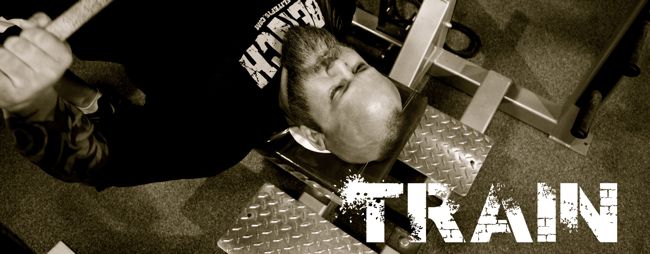
The word 'train' is heavily programmed into my vocabulary. As you can tell from my last article ("I Can Leg Press More Than You"), 'training' is what we should inhale and exhale as we toss around weights. Better yet, I think every gym should plaster it all over the walls to remind people that the gym is a place for blood, sweat, and heavy weights. I didn't include tears because I'm assuming that if you train, you aren't on the elliptical breaking up with your significant other through text messages.
The world out there is full of information. You can type just about anything into a search engine and you will be directed to all sorts of jargon. Want bigger biceps? Click here…Want to increase your bench? We have just the supplement for you…Want bigger calves? Get implants…
If training were this easy, life would be easy, which means I would have a beach house in Malibu with one of the Victoria’s Secret Angels as my own personal chef. I'm twisted in some sort of illusion, but training isn’t even remotely close to being picture perfect. Neither is my life or yours for that matter unless you're Nate Green or John Romaniello.
Strength training protocols are the hands on the clock. Time wouldn't exist if those hands didn't produce the future. If the foundation of these protocols didn't exist, our blueprint for training would be similar to watching an episode of Jersey Shore, and I'm sure you can clearly see where I'm going with this.
As many strength coaches will tell you, there isn't one best method, yet there are methods that are much preferred. We see it every day. Some trainer comes out with some program that makes Metamorphosis by Tracy Anderson look intriguing (I take that back). As strength coaches, it's critical that we take into account the various biological make up of our athletes. Nervous system efficiency, structural factors, training experience, and injuries are areas that will influence an athlete’s progress. We should also be aware of how well our athletes respond to various training protocols from the beginning stages of training toward the more advanced stages. Adaptation and accommodation are both important feedback mechanisms. However, you will always run into some cable crossover grunter who wears gel as if it was some sort of muscle enhancing supplement tell you that he only responds to bodybuilding workouts. My immediate response is, “How much do you cable crossover? Your numbers look impressive.”
So much goes into designing an athlete’s program that it can be overwhelming to construct one. Even the best coaches who don't necessarily struggle with this area forget to sleep because they have eight weeks to put together a formula that doesn't exist on the periodic table. Can we consider them perfectionists or just analytical? I think it's safe to argue that both attribute to a strength coach's chemical make-up. We want the best results through efficiency and safety. This is why it's necessary to understand why we choose the various training protocols while we sit in the gym at midnight constructing our lab. We are perfectionists. If we aren't, our athletes will never confront and power through failure. We are analytical. If we aren't, we might as well go run a marathon.
What truly defines strength? Is it solely based on the ability of the muscles to exert force against a load, or is there something that we sometimes forget to confront? There are essential components when it comes to getting ridiculously strong. There are methods that we can spend days discussing and years implementing. We all want to get stronger, remain injury free, look good, and live a healthy life. We want to be in the gym to train. We want to design programs that our athletes will bring with them when it comes to competing. But for them to compete, we need to compete. Whether it's physically or mentally, it needs to be present for us to design and implement. We are strength coaches and that means having the desire to bleed, sweat, and toss around heavy weights that we leave stained on the gym floor.
The best strength coaches have thrown down the books, inhaled the smell of iron, and exhaled the true athlete. Program design is critical, necessary, and timeless. Yes, timeless because it's your blood, your sweat, and your heavy weights that left the footprints your athletes get to walk with.









